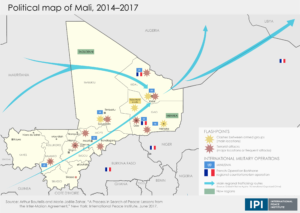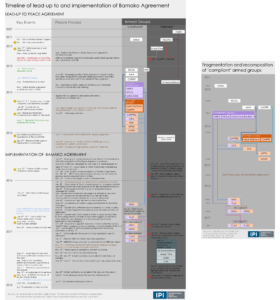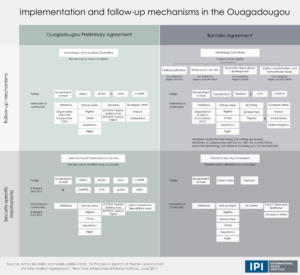Installation of interim authorities in Kidal, Mali, February 28, 2017. (MINUSMA/Ag Cheick Nasser)
The 2015 Bamako Agreement was supposed to usher in a new era of peace and stability in Mali. However, not only has there been little progress in implementing the agreement, but the security situation remains volatile. This state of affairs is all the more troubling given the international community’s mobilization in support of the Malian state. Why, in spite of this mobilization, are some warning that the peace agreement is in danger of collapse?
The end of the Bamako Agreement’s two-year interim period on June 20, 2017, provides an opportunity to assess progress on its implementation. This report traces the difficulties of implementing the peace agreement by placing current events in Mali in the context of past peace processes in the country and the 2014–2015 Algeria-led mediation process. It focuses in particular on six key issues that have created challenges during implementation:
- The government’s role in implementation: While the government has recently shown greater will to move ahead, implementation has lagged, and the method of implementation has created tensions with armed groups and contributed to the dysfunction of follow-up mechanisms.
- The fragmentation and recomposition of armed groups: Continuous realignments among armed groups have created challenges for the mediation team, allowed the government to blame the stalled implementation on insecurity, and caused these groups to focus more on community-based and individual perks than on peace dividends.
- The “clanization” of the peace process: Power struggles between and within clans have fed into the cycle of insecurity and contributed to stalling implementation.
- “Unspoken factors” including terrorism and trafficking: While the negotiations did not address terrorism and organized crime, these have become pressing challenges during implementation.
- The lack of peace dividends and societal buy–in: Slow implementation in the area of development has weakened buy-in to the process among northerners, while perceived concessions to armed groups and northerners have weakened buy-in in the south.
- Maintaining unity of action and purpose in the international community: The diversity of actors on the international mediation team has sometimes helped hammer out agreements but has also made it difficult to maintain unity of vision and a constant level of engagement.
Based on these challenges, the report identifies a number of lessons for UN engagement in peace processes.
This publication is part of a project funded by ifa (Institut für Auslandsbeziehungen) with resources provided by the German Federal Foreign Office.
In January 2018 IPI translated this report into French and updated the translated version.











